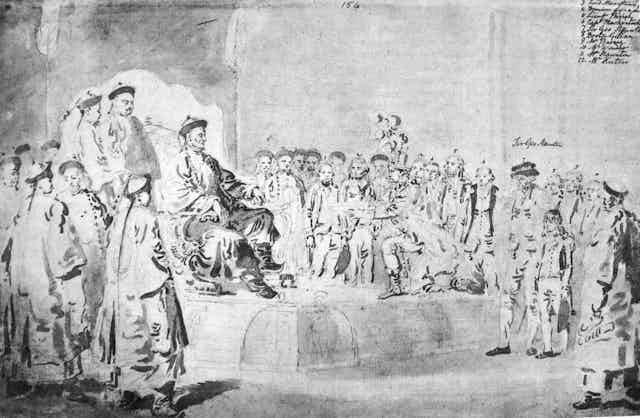With Britain’s position in Brexit negotiations weakened by the failure of the ruling Conservative party to win a majority in the country’s recent general election in June, we should ask ourselves how the country found itself in this situation.
A major plank of the support for the leave campaign was a nostalgic longing to return to an idealised Britain of the past – and the UK is not alone in such reminiscences. The Chinese politician Sun Yat Sen, who inspired and led the revolution that overthrew China’s final Qing dynasty in 1911, spoke of a “longing for the China that once was”.
UK government policy is to bolster Britain’s ties with the Commonwealth – apparently referred to as “Empire 2.0”, reflecting a nostalgia for a return to the days when Britain was a global power, while at the same time causing understandable controversy in former colonies. The legacy of Britain’s empire has also been cited as one of the roots of this newfound “British exceptionalism”, alongside a desire to return to a pre-globalisation era – whereas the EU, on the other hand, stands as an example of globalisation.
This nostalgia can have problematic consequences: the Chinese Empire under the Manchu Qing dynasty was in a period of decline, running parallel to the rise of imperial Britain. With the apparent reversal of Britain and China’s fortunes in the 21st century, examining the Chinese experience of the time may provide a useful lesson for Britain in years to come.
China of the 19th century was dubbed by the British envoy, Lord Macartney, referring to the warship of the time, as an “old, crazy, first-rate man o’war which a fortunate succession of able and vigilant officers have contrived to keep afloat for these hundred and fifty years past”. China’s borders had reached their greatest extent but the nation was a fading power, its authority largely based on its sheer size and the impact of its ancient culture.
Macartney’s remarks came after his failed attempt to establish an embassy at the court of the Qianlong Emperor, who demanded that Macartney show him the same deference that a tributary state would display. The emperor’s attitude, while reflective of the Sino-centric norm in Asia, was out of step with the rapidly industrialising European powers who would eventually shatter this order. This was exacerbated by the fact that Macartney’s mission saw the importation of goods invented by China, where the knowledge required for their manufacture had been lost.
Echoing this centuries later, David Cameron’s former speechwriter Claire Foges called for a new “Buy British” campaign to bolster British industries under threat from Brexit. But just as with China in the Qianlong emperor’s day, many skills required for their manufacture have been lost.
In an ironic echo of Britain’s formerly world-leading role as the first industrialised nation, it is China that is fast becoming the world’s workshop. This tension is highlighted by trade concerns between the two states, particularly in regards to the role of Chinese steel in the threatened closure of the Port Talbot steelworks in South Wales. While this does not quite match the disparity that Macartney witnessed, it shows that a nation’s perceptions of its strengths are not necessarily correct.
Internal problems

The Chinese Empire of this period was also dogged by internal struggles, particularly under the influence of the dowager empress Cixi, who influenced Chinese politics for much of the twilight years of the Qing dynasty. Cixi would play the competing factions of the imperial court against each other in order to preserve her power, often favouring conservatives against reformers. This strengthened her position, but prevented the reforms the empire needed to survive. Several catastrophic decisions, notably the not-so-covert support for the anti-Western Boxer Rebellion, served to dig the grave of the Chinese Empire.
Both of Britain’s leading political parties seem also to be obsessed with internal struggles rather than dealing with the pressing external issues the country faces. Proclamations of the “Global Britain” that will emerge post-Brexit seem rather hollow, as reflected by Prime Minister Theresa May’s strident tone that seems aimed at placating audiences at home rather than at securing a good deal for Britain. And again, there can be found another similarity in the dying days of the Qing dynasty to the challenges facing Britain today.
Undiplomatic diplomats
Wanyan Chonghou, described as “China’s worst diplomat”, began his career in an officialdom where knowledge of the outside world was not a virtue. Sent to gain concessions from Tsarist Russia, Wanyan instead ended up making concessions to them, ceding parts of northern China to Russian control. The legacy of this move continues to haunt the unsettled Uygur Autonomous Region of Xinjiang to this day.

In light of Brexit, Britain may have found its own Wanyan Chonghou in the appointment of the notoriously undiplomatic Boris Johnson as foreign secretary. Johnson’s appointment has raised eyebrows abroad and is a move grounded in domestic rather than international affairs, aimed at maintaining party unity while also neutralising one of May’s potential rivals.
We have yet to see if Johnson will make concessions as disastrous as Chonghou, but initial signs are not promising. Johnson is seen more as a celebrity than a politician, known for a series of blunders abroad as well as for insulting nations and leaders. In high-stakes diplomatic negotiations, such gaffes may be in the mind of any European negotiator – which may mean that Britain may concede as much as it gains.
What can we take from the last days of the Chinese Empire 100 years ago? A government focuses on internal intrigue at the expense of international relations. Failing to see the nation’s own strength, and that of the outside world, in an accurate light had dire consequences for imperial China. Britain should consider such lessons in these uncertain times.

